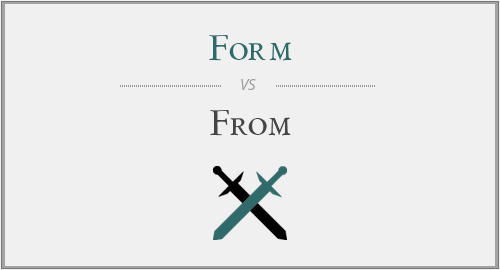Form
Form is a noun that refers to the shape, structure, or appearance of something. It can also refer to a document that is filled out to provide information or a request for something. Additionally, it can be used as a verb to describe the act of creating or shaping something.
For example, if a person fills out a job application, they must complete a form with their personal information. A sculpture artist may create a clay form of their artwork before casting it in bronze. A group of people may form a line to board a bus.
Some synonyms of form include shape, structure, and arrangement.
From
From is a preposition that indicates the starting point or origin of something. It can also refer to the source of information or the person or thing that something is directed towards or received from.
For example, if a person is traveling to New York from Los Angeles, they are starting their journey in Los Angeles. A news article may quote information from a government report. A gift may be received from a friend or family member.

Some synonyms of from include originating, originating from, and starting at.
Usage
It is important to use the terms form and from correctly in different contexts. Form is used to describe the shape or structure of something, or the act of creating something. From is used to indicate the starting point or origin of something, or the source of information or direction.
Here are some examples of correct usage:
- "Please fill out this form with your contact information."
- "The artist created a beautiful form of their sculpture."
- "I am traveling to Paris from London."
- "The news article quoted information from a government report."
Conclusion
Form and from may sound similar, but they have different meanings and usage in the English language. Form refers to the shape or structure of something, while from indicates the starting point or origin of something. By understanding the difference between these two terms, we can use them correctly in our communication and avoid confusion.




Have a discussion about this article with the community:
Report Comment
We're doing our best to make sure our content is useful, accurate and safe.
If by any chance you spot an inappropriate comment while navigating through our website please use this form to let us know, and we'll take care of it shortly.
Attachment
You need to be logged in to favorite.
Log In